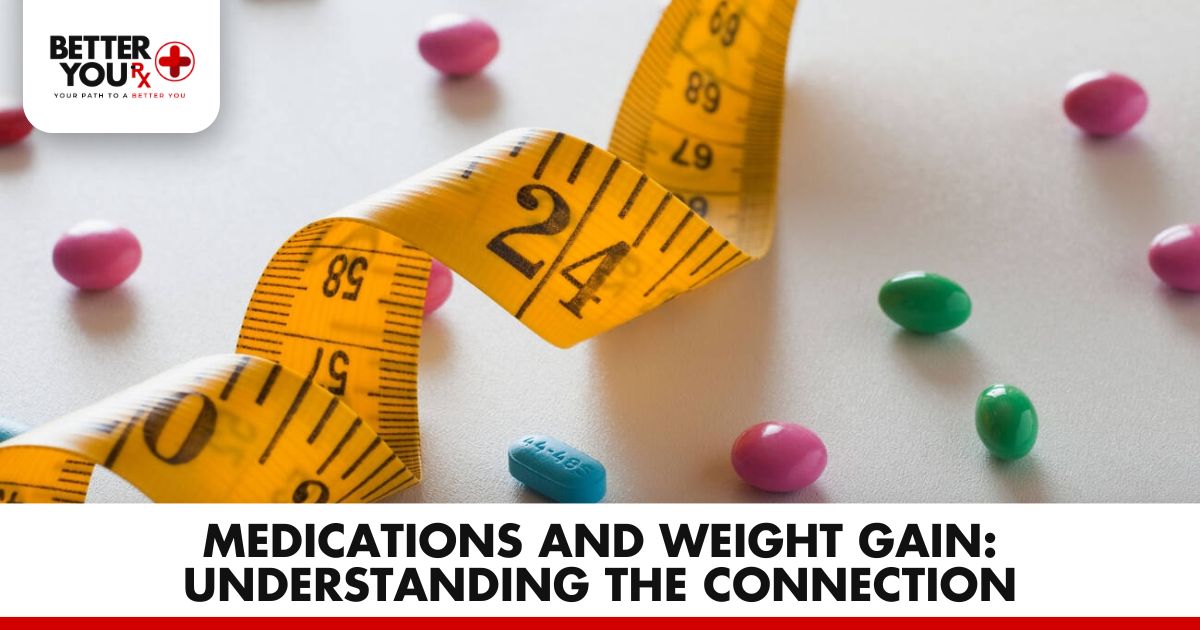When it comes to managing our health, medications play a crucial role in treating various conditions. However, it’s important to be aware that certain medications can potentially lead to weight gain. In addition to lifestyle factors such as poor diet and lack of exercise, the use of specific drugs has been associated with weight gain.
At Better You RX, we believe in providing comprehensive healthcare, including access to medications from Canada to the US, to help individuals improve their well-being. This article will explore the relationship between medications and weight gain, discuss common culprits, and offer strategies for mitigating this side effect.
Medications That Can Contribute to Weight Gain
While not all medications are associated with weight gain, several commonly prescribed drugs have been found to cause weight changes. Understanding the potential impact of these medications can help individuals make informed decisions regarding their healthcare. Here are some categories of drugs that have been linked to weight gain:
Medications Affecting Metabolism
Certain medications can alter the body’s metabolism, leading to a decrease in calorie burning. Weight gain can occur over time when the body’s ability to burn calories slows down. Awareness of these medications and discussing potential alternatives with your healthcare provider is essential.
Corticosteroids
Corticosteroids are frequently prescribed to manage inflammatory conditions such as arthritis, asthma, and skin disorders. However, these medications stimulate appetite and increase cravings for high-calorie foods. Additionally, corticosteroids can interfere with glucose absorption, leading to fat deposits, particularly in the midsection.
Beta-blockers
Beta-blockers are commonly prescribed to treat high blood pressure, migraines, and certain heart conditions. Unfortunately, one side effect of beta-blockers is fatigue and shortness of breath, making it challenging to maintain regular exercise routines. Reduced physical activity can contribute to weight gain.
Calcium Channel Blockers
Calcium channel blockers are medications used to manage high blood pressure. While these drugs effectively control blood pressure, they can also cause water retention, resulting in temporary weight gain. It’s important to note that this weight gain is often a result of excess fluid and not fat accumulation.
Antipsychotic Medications
Antipsychotic medications are prescribed to individuals with conditions such as schizophrenia, bipolar disorder, and depression. Unfortunately, many of these medications have been associated with significant weight gain. Drugs like Paxil (paroxetine), Zoloft (sertraline), Clozaril (clozapine), Seroquel (quetiapine), Zyprexa (olanzapine), and Risperdal (risperidone) have been shown to cause weight gain in some individuals. The U.S. Food and Drug Administration (FDA) has even required manufacturers to include a warning about the increased risk of diabetes and hyperglycemia associated with their use.
The Impact of Weight Gain from Medications
The amount of weight gained as a result of medication use varies from person to person and can range from a few pounds to over a hundred pounds. Unfortunately, many of these drugs are used to manage chronic conditions, meaning they are taken over a long period. This prolonged use can contribute to substantial weight gain and increase the risk of developing serious health conditions, such as diabetes, high blood pressure, osteoarthritis, metabolic syndrome, and high cholesterol.
In addition to the physical health consequences, weight gain from medications can also have a significant impact on a person’s emotional well-being. The changes in appearance and the stigma associated with weight gain can lead to feelings of self-consciousness, lowered self-esteem, and even depression. Consequently, some individuals may choose to discontinue their medication or reduce their dosage without consulting their healthcare provider. Such actions can harm their health, as underlying medical conditions may go untreated.
Managing Medication-Induced Weight Gain
If you are concerned about the potential weight gain associated with your medication, it is essential to communicate openly with your healthcare provider. They can offer guidance and explore alternative medications with fewer or no weight-related side effects. It’s crucial never to stop taking a medication or adjust the dosage without medical supervision.
To mitigate weight gain while taking medication, consider the following strategies:
Dietary Modifications
Working with a registered dietitian can help you develop a meal plan that supports your overall health while managing potential weight gain. They can offer personalized recommendations on portion sizes, nutrient-dense foods, and strategies for dealing with medication-induced appetite changes.
Regular Exercise
While fatigue or reduced energy levels may be side effects of certain medications, engaging in regular physical activity can still be beneficial. Consult with your healthcare provider or a fitness professional to determine appropriate exercise options based on your condition and ability.
Close Monitoring
Regular check-ups with your healthcare provider are essential to monitor your overall health and assess any changes in weight or well-being. They can provide guidance on managing weight gain and help identify any complications that may arise from medication use.
Seeking Alternatives
In some cases, your healthcare provider may be able to prescribe alternative medications that have a lower likelihood of causing weight gain. It is crucial to have open and honest communication about your concerns and preferences while keeping your health and treatment goals in mind.
The Takeaway
In conclusion, it is essential to be aware of the potential for weight gain associated with certain medications. However, it’s important not to discontinue or adjust your medication without consulting your healthcare provider. They can provide insights, explore alternative options, and offer strategies to manage weight gain effectively. By working collaboratively with your healthcare team, you can prioritize your well-being and find a balanced approach to medication management.



